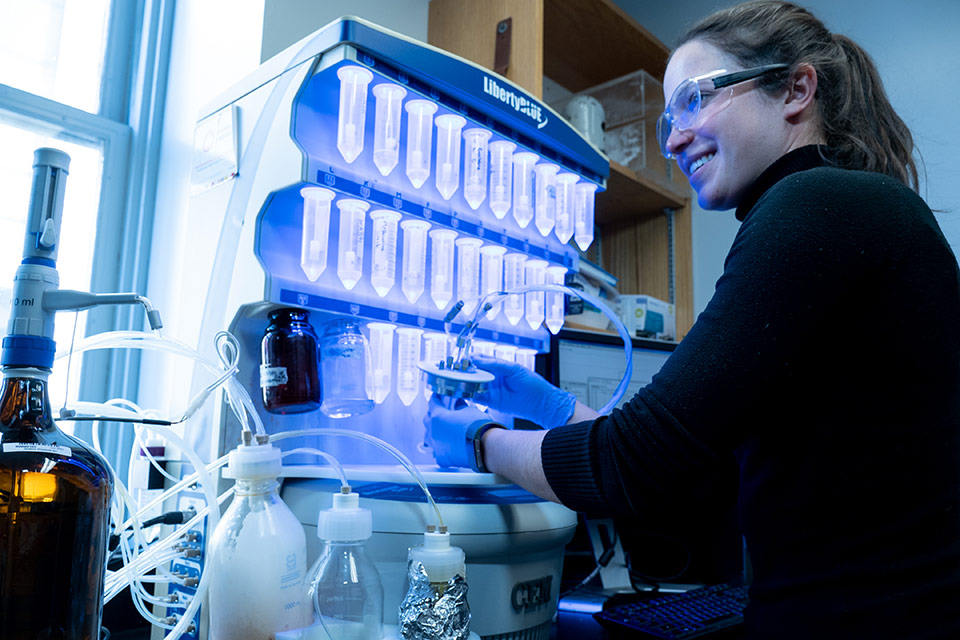
Careers in Chemical Engineering
Where can a career in chemical engineering take you?
The only program of its kind in North America, our Engineering Chemistry program is dually accredited- meaning when you graduate, you will be eligible to become both a chartered chemist and a professional engineer. Since 1895, our unique Engineering Chemistry program has graduated leaders in both chemical engineering and chemistry.
Engineering Chemistry connects chemistry and engineering design, to discover innovative solutions for the most challenging problems in the chemical sciences. Graduates of the program are experts in the chemistry behind industrial processes. A strong foundation in both chemistry and engineering prepares our students to tackle problems at an industrial level.
As a graduate of this program, you’ll have a strong grasp of fundamental science and the engineering tools needed to put this knowledge into practice. You will learn:
Through applying this core knowledge, you'll learn to design and improve processes and materials, ranging from fuel cells to pharmaceuticals.
Our specialized curriculum combines studies of analytical, electrochemical, and organic chemistry with extensive training in engineering sciences including transport phenomena, thermodynamics, and reaction kinetics. This will prepare you for all stages of design activities including detailed equipment specifications and financial analyses. Our program also readies you to solve problems in areas of societal need, such as alternative energy, clean water, sustainable agriculture, and healthcare.
The defining quality of an engineering chemist is a willingness to tackle complex, multi-disciplinary problems. As a graduate of the Engineering Chemistry program, you’ll be uniquely positioned to excel in both chemistry and chemical engineering. Our graduates have found remarkable success in industry, consulting, entrepreneurship, and academia.
Students of both Engineering Chemistry and Chemical Engineering gain experience in designing large-scale chemical manufacturing plants. However, the Engineering Chemistry program integrates advanced knowledge of organic chemistry, analytical chemistry, and electrochemistry into the design curriculum. With its dual accreditation, graduates of the Engineering Chemistry program are eligible to become both chartered chemists and professional engineers.
Engineering Chemists have broad design capabilities, with focus on three important areas:
Quantifying trace amounts of organic and inorganic compounds is essential technology for environmental monitoring, medical diagnostics, forensic, and security applications.
Engineering chemists learn contemporary analytical chemistry techniques such as nuclear magnetic resonance (NMR) spectroscopy, mass spectrometry, and chromatography that are at the heart of a modern chemistry degree.
As part of their engineering training, students combine knowledge of analytical chemistry with core concepts in fluid mechanics and microelectronics to design devices for consumer and industrial use. This includes microfluidic systems, lab-on-a-chip technologies, and portable devices for field applications.
Engineering chemists have held a wide range of positions in technology start-up companies. Look up Spectra Plasmonics and ENDETEC for examples of analytical device manufacturing companies launched by Queen’s University professors with the support of our graduates.
Courses that contribute to this design pillar include:
Satisfying the energy needs of an expanding global population is one of the most important challenges of this generation’s engineers. Electrochemical technology for energy conversion and storage is needed to shift from non-renewables to more sustainable, distributed energy systems. This includes batteries, electrolyzers, fuel cells and supercapacitors, all of which are constructed using electrochemistry.
Situated at the interface of applied chemistry and engineering design, the Engineering Chemistry program is uniquely positioned in the field of alternative energy. The curriculum combines fundamental electrochemistry with chemical thermodynamics and transport phenomena, producing graduates capable of creating, testing and manufacturing energy systems for consumer and industrial applications.
How do you store excess energy generated by solar/wind farms for later use? What are the efficiencies of different energy storage technologies, and how does their performance relate to their cost? These are some of the energy-related questions that engineering chemists answer in their laboratory and project-based work.
Courses that contribute to this design pillar include:
Complex organic molecules such as pharmaceuticals, agrochemicals and polymeric materials are essential to human health. Engineering Chemists study the fundamentals of organic reactions as well as modern methods of synthesizing these molecules on laboratory and commercial scales.
The application of Green Chemistry, wherein chemical manufacturing processes are (re)designed to minimize material and process hazards, is a central concept. The goal is to improve the efficiency of fine chemical syntheses while reducing health and safety risks to workers and the environment.
The role of an engineering chemist in process design ranges from early-stage innovation, when knowledge of basic principles is needed to create and/or advance new technology, to late-stage design, when detailed equipment specification and financial analyses are required. This broad design scope is a distinguishing feature of the Engineering Chemistry program.
Courses that contribute to this design pillar include:
The Engineering Chemistry Program is a discipline within our common core program. Apply to general engineering, and at the end of first year, you are guaranteed your program of choice.
Please see our course descriptions for a complete overview of the topics you may study in this program.
Looking to get a head start on your career? The Queen’s Undergraduate Internship Program (QUIP) gives students the opportunity to take a full-time, paid 12–16-month internship. Apply your skills to the workplace and gain on-the-job experience as you work with one of our many industry partners.
Hear from Elaine Monteiro about her experience working full-time as an intern with Procter and Gamble.

Careers in Chemical Engineering
Where can a career in chemical engineering take you?
Undergraduate Studies Program Assistant
Liann Joanette
liann.joanette@queensu.ca
613-533-6000 ext. 74829
Dupuis Hall, Room 201